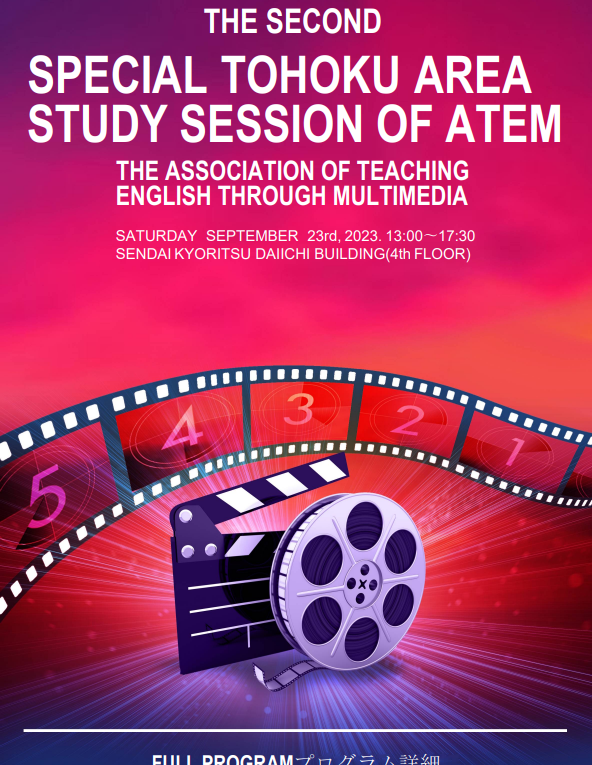
日時: 9月23日(土曜日)、13:00〜17:30
会場: 仙台協立第一ビル 4階(4E)
仙台市青葉区国分町1丁目8-13 map
地下鉄南北線「広瀬通駅」より徒歩7分
Date: September 23rd (Sat.), 2023
Place: Sendai Kyoritsu Daiichi Building 4th floor (4E)
1-8-13 Kokubunsho, Aoba-ku, Sendai map
7 minutes on foot from the Hirose-dori Station on the Subway Namboku Line
13:00
開会あいさつ
13:10-13:30
中村 佐知子(東北大学)
桜井 静(東北大学)
ChatGPTを活用したアカデミック・ライティング―学習者の気づきを促す指導
概要:2022年11月にOpenAI社が公開したChatGPTは、英語学習に革新的な変化をもたらすことが期待されている。それに伴い、関連研究が急ピッチで進んでおり(e.g., Mizumoto & Eguchi, 2023; Takenouchi, 2023)、英語ライティング添削の補助ツールとしても着目されている。当発表では、2種類のライティング(オピニオン・ライティング、サマリー・ライティング)の添削ツールとしてChatGPTを使用した授業実践例を紹介する。学生は、自分の書いたものをChatGPTで分析し、表示される「改善のためのコメント」や「改善されたライティング」を読み、「どうすればより良いものが書けるか」について自己分析を行った。この課題では、『英語教育の哲学的探求3』( https://yanase-yosuke.blogspot.com/ )で公開中の「学術英語ライティング添削・改訂プロンプト」を使用した。事後アンケートから、学習者が個別で具体的な校正ポイントを学び、語彙や文構造などへの洞察が深まったと感じていることが分かった。
<Q&A 13:30-13:40>
13:45-14:05
日影 尚之(麗澤大学)
映画 Notting Hillーロマンチック・コメディーの系譜と境界の攪乱
概要:このロマンチック・コメディーは、ハリウッド・スターAnna Scottのメディア映像で始まり、もう一人の主人公Williamも映画などを通してAnnaを知ってはいるが、別世界の女性、 “heavenly” =「天の」/「美しい」女性と見ているようだ。そのAnnaが、まるで天上界から降りてきた(?)、または世界を隔てる壁の向こうから飛び出してきたかのようにWilliamの生活圏に飛び込んでくることで物語が動き出す。
Antony Johae (2009)も示唆するように、Anna がactress、Williamがとっさに別人のふり(演技)をしたり、劇中劇のようにWilliamやAnnaが映画を見たり、演じる者と見る者(舞台と観客)、フィクション(映画)と現実の境界が曖昧になるようなモチーフが見つかりそうである。 主にJohaeに依拠しながら様々な境界/壁の攪乱について考察できればと思う。
<Q&A 14:05-14:15>
14:20-14:40
大月 敦子(専修大学)
「動詞キューワードで学ぶアクティヴラーニング英会話ワークブック」基礎編の開発
概要:どのようにしたら自分の言葉で英語が話せるようになるのか?それは動詞をCue Word(キューワード)として利用することで可能になると本研究は考えている。Cueとは、映画や舞台等での台詞の出だしとなる言葉のことをいう。ではなぜ動詞なのか?なぜなら英語の文は、動詞を中心に組み立てられているからだ。つまり動詞が決まれば、主語、目的語、補語等が、さらに形容詞や副詞などの修飾語も決まってくるのである。動詞Cue wordを見ただけで、英文が頭の中で組み立てられるという訳だ。実に理に叶った学習法といえる。そして暗記に頼らず考えながら英語を自分の言葉で話す力をつけることによって、英会話の応用力・汎用力が期待できると考えている。本研究によって開発された「動詞キューワードで学ぶアクティヴラーニング英会話ワークブック」基礎編を紹介する。
*本研究はH25~H27年度科学研究費助成金基盤研究(C) 課題番号25370655による研究成果の一部である。
<Q&A 14:40-14:50>
<<Tea Break 14:50-15:10>>
15:10-15:30
Barry Kavanagh (Tohoku University)
Unlocking the Power of ChatGPT: Navigating the Promises and Perils for Teachers in Second Language Writing assessment
Abstract: The existing body of research within the field of English language education and Artificial Intelligence demonstrates the potential of AI to enhance students’ speaking skills, bolster reading comprehension, and boost motivation. Yet, little emphasis has been placed on the teacher’s viewpoint in the context of AI, and investigations into ChatGPT’s role as a writing assessment tool remain at an early stage of development. This study investigates the promises and perils of ChatGPT in assisting teachers with assessing student academic writing at a Japanese university.
Students were given an agree/disagree essay question based on the TOEFL Independent writing task’s principles that asks them to provide their opinion on a given topic. The teacher graded the student essays with reference to TOEFL’s Independent Writing Rubric. This was followed up with an experiment to assess how ChatGPT would evaluate the essays using the same rubric.
Although ChatGPT followed the evaluation rubric well and showed significant improvement with relevant prompts, mistakes, and occasional disparities between the human rater and ChatGPT were made. Given these disparities, it remains essential to underscore the importance of maintaining a human-centered approach in AI-enhanced formative assessment. ChatGPT can offer valuable support but should not be seen as a complete substitute for the human rater.
<Q&A 15:30-15:40>
15:45-16:05
小泉 勇人(東京工業大学)
“How do civilized human beings participate in destructive, inhumane acts?”ー 映画Experimenter(2015)で学ぶミルグラム実験 ー
英語教育で用いる映画には娯楽性が期待されることも多いが、CLILの観点からは、社会の諸問題や歴史をヴァーチャルに体験する英語教育も可能であろう。例えばヴェトナム戦争(深津、2017)、アメリカ資本主義(横山、2020)、ジェンダーロール(吉村、2022)に注目した内容言語統合型学習の研究が進められてきている中、当発表では社会心理学を主題とする映画Experimenter(2015)に注目する。かつてハンナ・アーレントがナチズムに見た「悪の凡庸さ」を心理実験で実証しようとするStanley Milgram博士の半生を描く本作であるが、本発表の狙いは、これを「ホロコースト」を考える特異な英語テキストとして位置づけることにある。Milgram博士が「第四の壁」を破る場面を取り上げ、その背後を非現実的に徘徊する巨像の表象を論じつつ、慣用句“elephant in the room”の含意を読み解きたい。
<Q&A 16:05-16:15>
16:20-17:20
Ryan Spring (Tohoku University)
Sachiko Nakamura (Tohoku University)
Workshop: How to Make Better Videos for Your Classes Part 2: Camera Proximity
Using video materials in language classes is an effective way for students to learn practical English. We can use movies, dramas, and YouTube videos, but we always need to consider limitations based on copyrights or other legal concerns. And also, it is sometimes difficult to find appropriate videos which include particular points we want to teach in class. Making our own videos can be the solution to those concerns, and many teachers have begun making original videos to contextualize words and phrases for their students. By doing so, we can prepare materials that are specifically tailored to the points our students need to learn. However, if videos are not made well enough, students will lose interest and might become bored with them. In this series, you can learn how to make quality videos using simple tools that most teachers have; a cell phone, a computer, and other simple items. In Part 2, we are going to teach you about camera distance. This will be an active workshop; you are going to shoot a video with your smartphone, learn some tips about camera distance, and re-shoot the same video using what you have learned.
17:20
閉会あいさつ